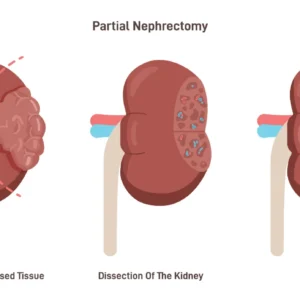Description
Familiarity with Treatment
Open splenectomy is a surgical procedure performed in two major clinical scenarios: trauma and hematologic disease. It is often necessary in cases of splenic injuries that may require splenectomy or, rarely, splenorrhaphy. The spleen is a highly vascular organ located in the left hypochondrium and partly in the epigastrium. Open splenectomy is typically performed in cases of severe splenomegaly, trauma, or hematologic disorders.
Procedure
During open splenectomy, the surgeon makes an incision in the middle of the abdomen and moves aside muscle and other tissue to reveal the spleen. The spleen is then removed, and the incision is closed. This procedure is typically performed under general anesthesia.
Who is it Suitable For?
Open splenectomy is suitable for individuals with severe splenomegaly, trauma to the spleen, or hematologic disorders that require the removal of the spleen. It may also be necessary in cases where laparoscopic splenectomy is not appropriate, such as in the presence of extensive scarring or complications from previous surgeries.
Who is it Not Suitable For?
Open splenectomy may not be suitable for individuals with specific contraindications to surgery or those who are not candidates for general anesthesia. In some cases, laparoscopic splenectomy may be the preferred approach, but open splenectomy may be necessary due to specific patient factors or surgical considerations.
Advantages
Advantages of open splenectomy include:
- Effective removal of the spleen in cases of severe splenomegaly, trauma, or hematologic disorders.
- Ability to address extensive scarring or complications from previous surgeries that may preclude laparoscopic splenectomy.
Complications
Complications of open splenectomy can include postoperative bleeding, wound infections, subphrenic abscess, ileus, portal vein thrombosis, thrombocytosis, thrombotic complications, and wound complications such as hematomas and seromas. Additionally, individuals who have undergone splenectomy are at risk of overwhelming post-splenectomy sepsis (OPSS) or overwhelming post-splenectomy infection (OPSI).
Preoperative Care
Preoperative care for open splenectomy involves a comprehensive evaluation by a healthcare provider to determine the need for surgery and the most appropriate approach. This may include medical risk reduction, diagnostic tests, and discussions about the procedure, potential risks, and expected outcomes.
Postoperative Care
Postoperative care for open splenectomy includes monitoring for complications such as bleeding, infections, and thrombotic events. Patients may require close follow-up to monitor for signs of overwhelming post-splenectomy sepsis and to receive appropriate vaccinations to reduce the risk of infections.












Reviews
There are no reviews yet.